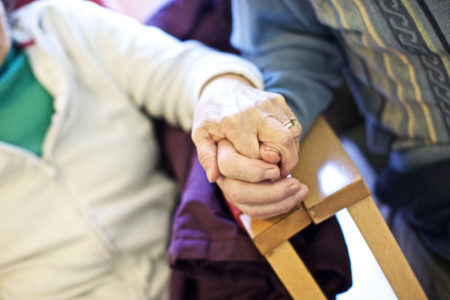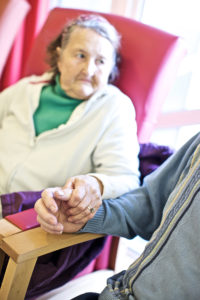Communications Officer Zoe Leahy recently got to spend a shift with the new frailty team at Pilgrim Hospital, Boston.
As a non-clinical member of staff I am always in awe when I get to see first-hand the care and support we offer our patients. My admiration reached new heights when I had the opportunity to spend a shift in Pilgrim A&E with the new frailty team.
I saw how the multi-disciplinary team (MDT) of a frailty consultant, advance care practitioners, occupational therapists, the care home liaison team, physiotherapists from the Trust and Lincolnshire Community Health Services NHS Trust (LCHS), as well as the LCHS assertive in-reach team (AIR), are working together to identify patients who are aged 65 years and older and are frail.
We all know that our A&Es are busy and that in Lincolnshire we have an aging population, but I must admit I was surprised to see just how many of our patients in the department were aged 65 and older. Last year, 20,531 patients in this age group visited the Pilgrim A&E department, which is more than any other ULHT hospital. So this new frailty team is constantly on the go.
Anyone who knows me will know that I love to talk and I must admit I have a real soft spot for the older generation. Given the chance, I can listen for hours to their stories.
This is why I was truly inspired by the frailty team and how they have quickly integrated with the emergency department teams. They are able to provide an additional service while patients are in the department, they give that extra bit of time to assess and look at their frailty score, identify any potential help that may be needed at home and ensure that it is put in place. They are reassuring, kind, caring, broach the difficult conversations with compassion and yet, unlike me, they don’t get distracted, as they know there are so many more patients they can help waiting on the other side of the curtain.
The relationships they have established in such a short period of time with their colleagues from LCHS, our CCGs and within the Trust is remarkable and is key to the success of the service. By having experts from frailty, occupational therapy, physiotherapy and adult social care all working together can only result in the best possible care for our frail and older patients.
Consultant Nurse for Frailty Deborah Birch said: “When frail patients are admitted we are proactive and can make any necessary plans for their discharge and request any future support they may need from the teams in the community. By working together and doing this early we can potentially reduce the length of their stay in hospital, get them home sooner and hopefully prevent any future visits. Partnership really is key to everything that we are doing and achieving.”
Research shows that for every 10 days of bed rest in hospital, the equivalent of 10 years of muscle ageing occurs in people over 80 years old. It takes them a lot longer to regain their muscle strength than it does to lose it. Seeing these patients laid in bed really opened my eyes as to how important it is to make sure there are no delays in getting frail patients home once they are ready to be discharged and that’s where the frailty team can help from the moment they arrive in A&E.
Little things really can make the world of difference. I saw one 92-year-old man change when he was helped out of bed by the team and into an armchair. He was no longer unsettled and constantly shouting out for attention, instead he was content, sat up eating toast and watching the world go by. He could see what is going on, rather than starring up at a ceiling feeling frightened, lost and confused.
Of course, what the team do is so much more than getting patients out of bed, but their remit allows them to focus on the whole patient, rather than the latest condition or injury. It is not just about treating their current ailment by putting a plaster on them and sending them home to have another fall or relapse, it is instead about seeing what can be done to help them remain fit, healthy, active and out of hospital with the best quality of life. This is about doing what is the right thing for our older and frail patients.
It is great to hear there are aspirations to continue to develop the frailty service across the Trust, something which is reinforced by the fact that Lincolnshire hospital staff were among the first in the country to be awarded Master’s degrees in frailty.

Deborah said: “Caring for frail older people is highly complex and requires skilled, trained staff who reinforce the values and standards of compassionate care. I am really proud that ULHT staff are among the first group in the country to receive their Master’s degrees. By having this knowledge as well as teams in our A&Es will really help our older patients, their families and also all of our healthcare colleagues in and outside of our hospitals.”
All of the progress made by the team has been helped by having the support of Alistair Nelson, who recently completed the Pilgrim reconfiguration project which was the biggest change in the hospital’s history.
Alistair said: “The integrated approach by the system is the future of providing the best possible care for our frail population within acute and community settings. As a team we are aiming to become an exemplar Trust for frailty.
“We know we have the full support of the system for this integrated approach.
“It is also very important to embrace the support and engagement from all of the other teams from ED to discharge, who are now in providing the best possible experience for our aging population.”
It is clear that the team are passionate about their work and the care we as a Trust provide for our older and frail patients. They are a great addition and ensure we provide the best quality, patient-centred care that is available.
